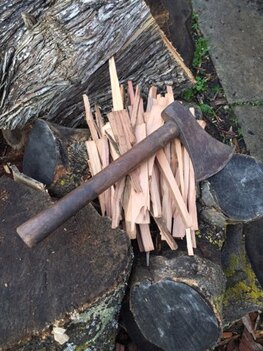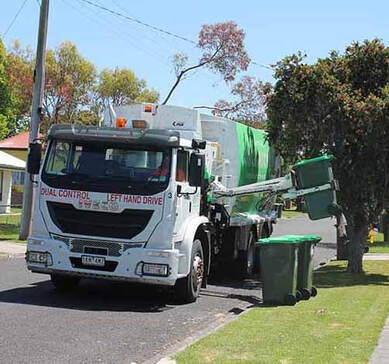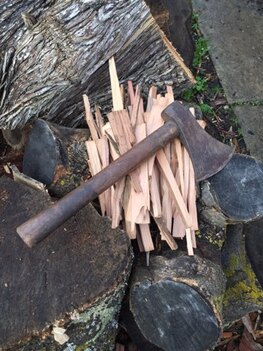 Glenn certainly had a go but he was no match
Glenn certainly had a go but he was no match for the forces of economic rationalism
NOW and then my mind turns to characters I haven't seen for a while. I don't mean friends and acquaintances – yes, I think of them too – but rather people to whom I was never introduced and whose names I never knew. Those people I would occasionally see as I shopped or walked, cycled or drove around the town but no longer see and haven't done so for some time, prompting me to ask myself 'What became of them?”
I wonder if other people have the same thoughts about strangers in their midst. Do regular users of White Road or South Dudley Road in Wonthaggi ask themselves what became of the character who was regularly seen striding along those roads like a man on a mission.
For those who have, I can tell you a little bit about him and his life. His name was Glenn Durling. AKA Dools, Dooley, and Pot Hole.
After leaving school, he got a job at Cyclone Forgings in Wonthaggi as a machine operator. He loved this work and his interest, skill and willingness to learn saw him put on the various machines of co-workers who might be absent from time to time. His keen observation led him to make suggestions to management to modify machines with a view to increased output or safety. His other skill was shit stirring his workmates and supervisors, always with a cheeky grin. He was certainly one of the most annoying characters I have ever known, especially during footy season. During the 1990s when his beloved North Melbourne was experiencing success, including two premierships, he became unbearable.
The forces of a globalised economy and economic rationalism put an end to his time as a machinist when shovels, hammers and other steel tools began appearing from other countries at a fraction of the cost of domestically produced equivalents. He was re-employed by a local recycling firm, running alongside trucks and throwing the contents of residential bins into them.
 Glenn was replaced by a ‘two armed bandit'.
Glenn was replaced by a ‘two armed bandit'. Glenn was raised in an era where waste was frowned upon. From the recycling conveyer belt he would remove antique bottles, books and old postage stamps, putting them aside for friends or acquaintances who collected such items. War memorabilia including discarded medals were taken to the RSL. If he came across steel tools manufactured in Germany or England at a time when such items were made to last, they would be offered to co-workers. He didn't see the point of melting them down in order to make inferior replacements that characterise modern times. He kept very little for himself.
Outside of working hours, he was rarely at home. That was a place to eat, sleep, or read a book. One of his favourite novelists was Dick Francis whose books have a running theme of horses. Otherwise, Glenn was out visiting, delivering the items he had found at work. After I finished up working at the recyclers – a job he had put me onto – he continued to bring me books that he thought might be of interest. In his earlier years, he could also be found at the local pubs but he gave that pursuit away as the years went on. He moved in a wide circle and was familiar with many marginalised and socio-economically disadvantaged people whom he regularly visited. He was at ease in their company along with anyone else who didn't have medals on themselves. I would constantly have to steer him away from talking about work, preferring to hear about his knowledge of the bush and natural world. He also liked recalling adventures from his youth involving his mates Jacko, and Oobs, now deceased. We disagreed on many points, both politically and socially, but we all have our reasons or rationale for the conclusions we reach.
'His idea of work was hands on. Satisfaction came with visible, tangible outcomes. He loved his job and he loved talking about it.'
Before too long, economic rationalism struck again. Pressure on the local council to reduce costs saw the sorting of recycled materials outsourced to Melbourne where it could be done more cheaply. This was the third time he had been screwed by advances in technology and economic priorities. During some of our encounters, we had discussed our increasing unemployability in many sectors of the economy due to the modern trend toward ageism.
While his life had been characterised by “having a go”, he was no candidate for a computer course at the local TAFE college. On the evolutionary chart, he could be classified as 'Pre-Digital Man'. The closest he came to embracing the computer age was learning to place a bet electronically when the option of doing so with someone on the other side of a counter was no longer available. One of the rare few people of his age not to own a mobile phone, he died without having ever sent or received a text message or email. His was the natural world with all its beauty and wonder, and his idea of work was hands on. Satisfaction came with visible, tangible outcomes. He loved his job and he loved talking about it.
 A Cyclone tomahawk – proudly made in Wonthaggi, perhaps by Glenn.
A Cyclone tomahawk – proudly made in Wonthaggi, perhaps by Glenn. I think of the annoying bastard from time to time. If my mind is not preoccupied, I think of him when I pull in to the post office in front of the bins; when I go past the Wonthaggi Club, the last place he saw his bicycle; when driving along South Dudley Road where he clocked up many kilometres; when chopping kindling with the tomahawk he procured for me from Cyclone; when North Melbourne have a memorable win or loss.
I wrote this piece because his life and contribution deserved more than the two square inches of newsprint he received aside from his death notices. It is not meant to be a comprehensive account of his life; just an outline and perspective of one person who came across him while he was amongst us. My memories of him begin with the image of a skinny, grinning, wide-eyed grade prep kid wearing the shorts of his St. Joseph's school uniform and go through to a greying man in his fifties, with considerable gaps in between.
Vale Dools.